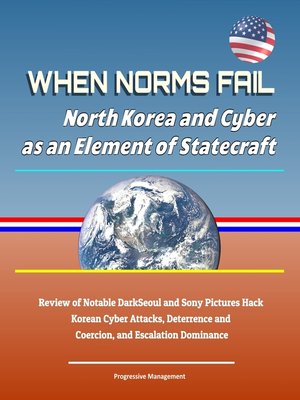When Norms Fail
ebook ∣ North Korea and Cyber as an Element of Statecraft--Review of Notable DarkSeoul and Sony Pictures Hack Korean Cyber Attacks, Deterrence and Coercion, and Escalation Dominance

Sign up to save your library
With an OverDrive account, you can save your favorite libraries for at-a-glance information about availability. Find out more about OverDrive accounts.
Find this title in Libby, the library reading app by OverDrive.



Search for a digital library with this title
Title found at these libraries:
| Library Name | Distance |
|---|---|
| Loading... |
This excellent report has been professionally converted for accurate flowing-text e-book format reproduction. With the increased reliance on information technology across society, nation states have begun to integrate cyber capabilities into their power projection strategies. While nation states use these increased cyber capabilities in attempts to wield greater influence in statecraft, cyber tools have not lived up to the hype of the great equalizer some claim it to be. To illustrate, this paper reviews select malicious cyber actions by North Korea in an effort to analyze the effectiveness of cyber as a form of statecraft for weaker states and potential deterrence responses by victims of such malign actions.
Powerful states already use cyber in attempts to coerce and deter actions by other states. Russia is perhaps the most active in this respect. Moscow's actions against Estonia in 2007 and Georgia in 2008 were obvious efforts at coercion and deterrence. In the Georgia case, cyber efforts were accompanied by military force, while Russia paired its cyberattacks with economic actions against Estonia. Both were of limited success in helping Moscow achieve its objectives but support Martin Libicki's finding that cyber is most effective as a support function for other elements of warfare, or state power. More recently, Russia has been suspected of using cyberspace to interfere with the democratic process of U.S. and European elections in violation of sovereignty norms.
While much has been written regarding great nation use of cyber for statecraft, less has been written about the use of cyber by weak and developing nations. This paper will examine notable cyber actions by North Korea to influence international actors and achieve national objectives. North Korean actions will further be compared against models of deterrence and coercion to determine the level of success achieved and concludes with suggestions for U.S. cyber policy as it relates to cyber deterrence. I will demonstrate that cyber can be an effective tool of statecraft for a nation if it can maintain escalation dominance.
Pyongyang has launched numerous cyberattacks since 2009, with some estimates claiming North Korea perpetrates as many as 250 million cyberattacks per day against South Korean online entities. Given the lack of Internet access to the general population, this activity indicates Pyongyang understands the importance of cyber as an asymmetric alternative and has invested heavily in its cyber warfare proficiency. With an aging military infrastructure and limited sources of national power, the DPRK has used cyber in an effort to exert pressure on stronger, more capable adversaries and retain its global relevance.







